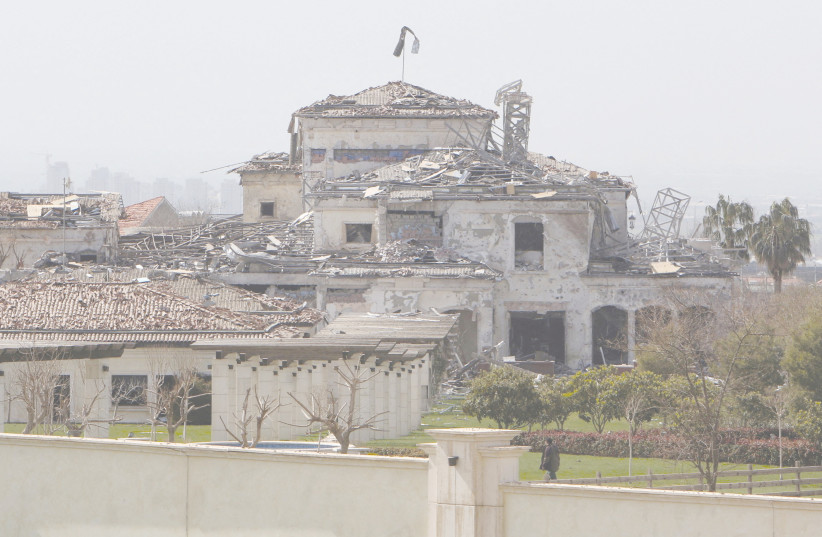Should our leaders not be warning the people of what is coming? Why the silence? Why the seeming indifference?

Two weeks ago, the Russian envoy to the nuclear talks in Vienna dropped a bombshell. “I am absolutely sincere in this regard when I say that Iran got much more than it could expect – much more,” Ambassador Mikhail Ulyanov told Iranian news outlet IRNA. “Realistically speaking, Iran got more than, frankly, I expected or others expected. This is a matter of fact.”
And in Israel, there was silence.
A week earlier, an IAEA report was leaked, which showed that the stockpile of enriched uranium amassed by Iran has dramatically grown to the point that its most highly-enriched material is just a jump away from a nuclear weapon.
And in Israel there was silence.
And then this week, on Wednesday, reports emerged that – in the framework of a new deal – the United States is considering removing the Islamic Revolutionary Guards Corps (IRGC) from the Foreign Terrorist Organization list. The news was earth shattering and would be an amazing prize to Iran, just days after Tehran took responsibility for firing ballistic missiles at a US consulate in Erbil.

And again, in Israel there was silence.
At this point, there is no longer hiding what should be obvious to every Israeli: Iran is on its way to getting the best deal it could have imagined, which will pave the way for it to one day obtain a nuclear weapon. At the same time, Israel is on its way to potentially facing a threat of an existential nature – and instead of fighting it tooth and nail, the leadership in this country is, for the most part, silent.
There are a number of reasons why Israel is largely silent. While it is true that Prime Minister Naftali Bennett, Foreign Minister Yair Lapid and Defense Minister Benny Gantz occasionally issue a statement against the coming deal and speak frequently with their foreign counterparts about it, this type of activity is a far cry from the way Israel has fought against nuclear proliferation in the past.
According to senior government sources, one of the reasons Israel is quiet is because its silence was a condition made by the Americans if Jerusalem wanted to receive regular updates from what was happening in Vienna. To get the information, Israel needed to tamp down its criticism – and the decision made was that knowing what was happening was crucial for Israel to potentially influence the outcome.
The problem is that Israel does not seem to have influenced the deal at all. Instead, what we are about to see signed is a deal that will be remembered as the worst possible for Israel and the best possible for Iran. It is shorter and weaker than the original JCPOA signed in 2015 and will ultimately lead to Iran obtaining a nuclear weapon if and when it decides to.
AND THIS leads to the second reason for Israel’s quiet, which is the more significant one – a general resignation that a bad deal is coming and Israel cannot do anything to stop it. It is almost an acceptance of the fact that Iran is going to get a bomb.
While this might be true, should Israel not at least try? Should our leaders not be warning the people of what is coming? Why the silence? Why the seeming indifference?
This is not to advocate for what former prime minister Benjamin Netanyahu did in 2015 when he went to Washington, spoke before Congress and poked a finger in the eye of President Barack Obama. The speech did not stop the deal but it did cause damage to the bipartisan support for the Jewish state that is still felt seven years later.
On the other extreme is Israel’s current policy of staying quiet.
In between these two options, though, there is a wide-open field of steps that can be taken. Bennett could fly next week to Europe and ask for meetings with leaders in Paris and London. He could get the leader of China on the phone or fly to Washington and demand a meeting with Biden.
He and Lapid could also hit the airwaves and speak every day on another international news channel. With the war in Ukraine still dominating the news cycle, it won’t be easy to get the world’s attention, but shouldn’t Israel try?
An example of Israeli paralysis was evident this week when it was thrown a softball – 49 Republican senators pledged to do everything in their power to reverse an agreement that does not “completely block” Iran’s ability to develop a nuclear weapon. But instead of hitting it out of the park, Bennett and Lapid didn’t say a word. They didn’t issue their own statement. Silence once again.
Bennett wasn’t always like this. Back in 2015, he traveled to Washington at the same time as Netanyahu and ran from studio to studio and back again to speak out against the JCPOA. When he became defense minister in 2019, he claimed to have come up with a new strategy for how to stop Iran, one that would take the battle to the Iranians and make it clear that they have too much to lose.
What happened to all of that? Where did it go? And why does it seem like Israel has given up? The resignation coming out of Jerusalem does not demonstrate strength; it shows weakness – and it should have Israelis concerned. While it is nice to see our prime minister serve as a mediator between Russia and Ukraine, let’s not forget that what is happening there has almost nothing to do with the State of Israel. On the other hand, what is happening in Vienna has everything to do with Iran. Shouldn’t we hear his voice on that, too?
THE SILENCE on Iran and the flurry of activity on Ukraine has some officials wondering if Bennett’s involvement in the war talks is not meant to distract attention away from what Israelis should really be caring about – the terrible deal that is coming in Vienna.
And this is what is important to keep in mind – when that deal is signed, there will be little way to explain it except as a failure by the Israeli government. When this government took office in June, its top members explained that they were resetting the ties with the United States and would be working to repair the damage Netanyahu had caused, especially to Israeli relations with the Democratic Party.
To some extent, they have repaired those ties, which is not something that can just be dismissed. On the other hand, the payoff is not seen when it comes to Iran.
And while it is important to not burn all its bridges so it will not be able to work with the Biden administration and its European allies the day after, it is also important for Israel to take a stand, especially on an issue like this that will have wide-ranging ramifications for the State of Israel, the Jewish people and the entire world for years to come.
DOES THIS mean all is lost? While our leaders like to say that Israel retains all options and will continue to do whatever is needed to protect itself, the chance of a military strike against Iran in the aftermath of a deal is between unlikely and impossible.
On the one hand, the diplomatic failure means that the only chance Israel has to make a difference is through military force. On the other hand, the ability to attack with a new deal in place will be limited – because if Jerusalem wasn’t willing to attack the negotiations before the deal was reached, why would it attack the facilities now that there is a deal? This is barring a scenario where there is a blatant violation and clear evidence that Iran is actively building a bomb.
In addition, what is important to keep in mind is that Iran’s nuclear facilities were built by Iran for Iran. This is unlike Iraq’s nuclear reactor, which was built by France and destroyed by Israel in 1981, and Syria’s nuclear reactor which was built by North Korea and destroyed by Israel in 2007. In both cases, when the reactors were destroyed, Iraq and Syria could not rebuild them on their own. They were still dependent on external assistance.
Iran is different. It has mastered the technology and know-how, so even if its facilities would be damaged, the ability to rebuild them would remain. This casts a cloud over the effectiveness of any future strike.
With that said, it is impossible to know what will happen after an attack. When Israel attacked Iraq’s reactor, the initial assessment was that it would delay Saddam Hussein’s plans by a year or two. It stopped them forever.
Is the same possible now with Iran? That is difficult to know. But now that it’s clear that diplomacy failed to stop Tehran, the specter of military force has risen higher than ever.
Content retrieved from: https://www.jpost.com/opinion/article-701626.